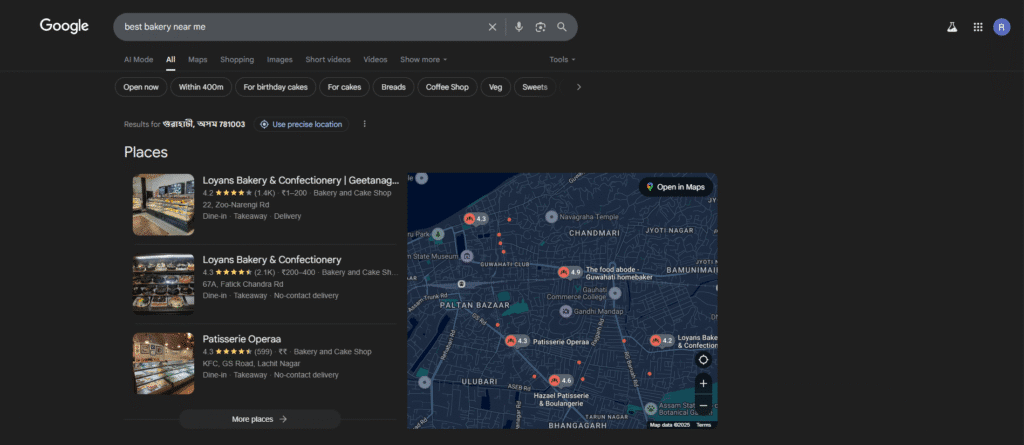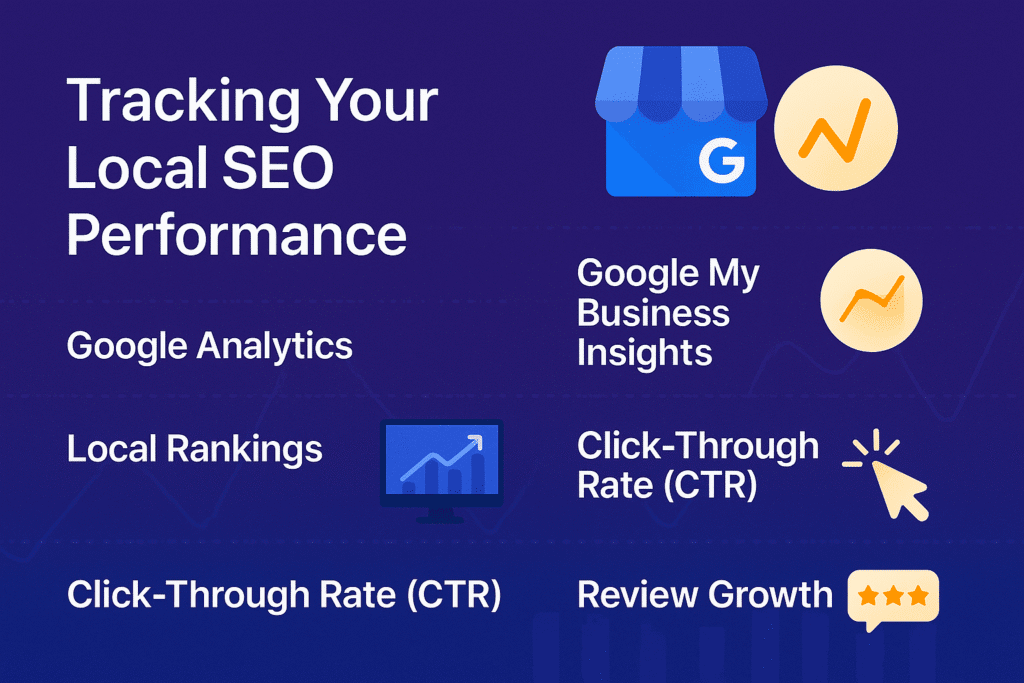In today’s digital world, local search engine optimization (SEO) is crucial for businesses that want to stand out in their community or service area. Whether you own a café, run a plumbing business, or manage a digital agency, local SEO helps your business appear in searches from nearby customers looking for your services.
This blog will cover what is local SEO, why it matters, how it differs from traditional SEO, and the significant benefits it offers small and medium-sized businesses.
What Does Local SEO Mean?
Local SEO, or Local Search Engine Optimization, is a marketing strategy aimed at improving a business’s online presence to attract more local customers. These searches occur on Google and other search engines and often include location-based keywords like:
- “best bakery near me”
- “plumber in [City Name]”
- “top-rated dentist in [ZIP Code]”

In straightforward terms, local SEO means making your business visible in local search results to increase traffic, leads, and sales from your specific area.
Unlike traditional SEO, which focuses on improving website visibility on a national or global level, local SEO connects you with customers in your community.
Why is Local SEO Important?
If you’re asking why local SEO is important, consider this: 46% of all Google searches have local intent.
When people search for products or services nearby, they are usually ready to buy. A solid local SEO strategy places your business right in front of these potential customers.
Here’s why it matters:
- Increased Visibility
You can appear in the local “3-pack” (top 3 map listings), which gets the most clicks in local search results.
- Higher Conversion Rates
Local customers tend to take action. According to Google, 76% of people who search for something nearby visit a business within 24 hours, and 28% of those searches lead to a purchase.
- Mobile Optimization
Most local searches occur on mobile devices. Local SEO ensures your business is mobile-friendly and easy to find for users on the go.
- Google My Business Ranking
Optimizing your Google My Business (GMB) profile is essential for local SEO. It lets users find your location, hours, contact info, and reviews in one place.
- Competitive Advantage
Many small businesses have not fully taken advantage of local SEO. A well-optimized strategy can help you outrank competitors in your area.
What is the Difference Between SEO and Local SEO?
A common question is: what is the difference between SEO and local SEO?
Here’s a breakdown:
Focus:
Traditional SEO: Targets a global or national audience.
Local SEO: Targets a local or regional audience.
Keywords:
Traditional SEO: Uses broad keywords like “best laptops.”
Local SEO: Uses geo-targeted keywords like “best laptops in Delhi.”
Search Results:
Traditional SEO: Appears in organic listings.
Local SEO: Appears in the Local Pack (Google Maps + GMB) and organic listings.
Link Building:
Traditional SEO: Focuses on general backlinks from niche or high-authority websites.
Local SEO: Focuses on local citations, business directories, and location-specific backlinks.
On-Page SEO:
Traditional SEO: Involves content optimization, meta tags, and site structure.
Local SEO: Includes location pages and consistent NAP (Name, Address, Phone) details.
Tools:
Traditional SEO: Commonly uses tools like Google Analytics and SEMrush.
Local SEO: Utilizes Google My Business, Moz Local, and BrightLocal.
So, what are local SEO services? These are professional services provided by digital marketing experts to improve your visibility in local search results. They typically include:
- GMB optimization
- Local keyword research
- Local citation building
- Review management
- Local content creation
- Mobile optimization
What is Local SEO Marketing?
Now that you understand local SEO, let’s talk about local SEO marketing.
Local SEO Services include all online activities aimed at increasing a business’s visibility in local search results. It combines traditional SEO practices with local signals such as:
- Location-based keywords
- Map optimization
- Customer reviews
- Schema markup (for local business)
For example, if you own a hair salon in Jaipur, your local SEO marketing would use keywords like:
- “Best hair salon in Jaipur”
- “Hair stylist near Hawa Mahal”
- “Bridal makeup Jaipur”
By targeting these specific searches, your business can attract local customers and convert them more quickly than with standard SEO.
Benefits of Local SEO for Small Businesses
If you run a local business and question the value of investing in SEO, here are some benefits of local SEO:
1. Target Ready-to-Buy Customers
Local SEO attracts customers actively searching for the services or products you offer, leading to better returns on investment.
2. Outrank Competitors in Maps
Showing up in the top 3 map results can greatly boost your click-through rate (CTR).
3. Build Trust and Credibility
Positive Google reviews and consistent NAP citations enhance your business’s trustworthiness.
4. Increase Foot Traffic
Drawing foot traffic through local searches is particularly beneficial for restaurants, salons, gyms, and retail stores.
5. Better Mobile Engagement
Local SEO helps ensure that your website is optimized for mobile searches, which is vital for location-based queries.
6. Improved Conversion Rates
Customers who find you through local searches are more likely to become paying clients.
Key Components of a Winning Local SEO Strategy
To succeed with local SEO, several key elements must be implemented. Here’s how to start:
1. Google My Business (GMB) Optimization
Claim and verify your GMB listing. Complete every field, add photos, respond to reviews, and update your hours regularly.
2. NAP Consistency
Make sure your Name, Address, and Phone number are the same across your website and online directories.
3. Local Keyword Research
Use tools like Google Keyword Planner, Ahrefs, or Ubersuggest to find local intent keywords.
Example: Instead of “digital marketing agency,” choose “digital marketing agency in Pune.”
4. Online Reviews
Encourage satisfied customers to leave reviews on Google, Yelp, Facebook, and industry-specific platforms.
5. Local Link Building
Create links from local directories (JustDial, Sulekha), chambers of commerce, and local blogs.
6. Location Pages
If your business has multiple locations, create individual landing pages for each with relevant content and location-specific keywords.
7. Schema Markup
Use LocalBusiness schema to help search engines better understand your business and improve visibility in local results.
Common Local SEO Mistakes to Avoid
Even minor errors in local SEO can impact your rankings. Avoid these common mistakes:
- Inconsistent NAP across directories
- Neglecting mobile optimization
- Failing to verify your GMB listing
- Choosing incorrect business categories in GMB
- Lacking online reviews or not responding to them
- Ignoring local content marketing
How to Measure Local SEO Success
Monitoring your local SEO performance is crucial. Here’s how:
- Google My Business Insights: Check how many people viewed or interacted with your listing.
- Google Analytics: Track local organic traffic and conversions.
- Local Rankings: Use tools like BrightLocal to monitor your local keyword positions.
- Click-Through Rate (CTR): Keep an eye on how often people click your GMB listing or local page.
- Review Growth: Track the number and quality of reviews over time.

Final Thoughts
If you’ve been wondering about local SEO, you now see it’s more than just a buzzword. It’s a powerful strategy for dominating your local market. Whether you own a physical store or provide services in a particular area, investing in local SEO is essential for growth.
With the right approach, local SEO marketing can help increase visibility, generate leads, and expand your customer base faster than ever. So don’t wait. Optimize your GMB, build local citations, create location-based content, and watch your local traffic grow!
FAQs
Q1. What is the main goal of local SEO?
The main goal is to enhance visibility in location-based search results and draw local traffic to your business.
Q2. Can local SEO help online-only businesses?
No, local SEO mainly supports businesses with a physical location or specific service areas.
Q3. How long does local SEO take to show results?
You might start seeing improvements in 2 to 3 months, but consistent efforts over 6 to 12 months provide the best returns.
Q4. What are local SEO tools?
Some useful tools include:
- Google My Business
- Moz Local
- BrightLocal
- Whitespark
- SEMrush Local SEO Toolkit
Need Help With Local SEO?
Whether you are just starting or looking to optimize your current local presence, professional local SEO services can give you a significant edge. We provide tailored solutions to boost your business’s visibility in your targeted area.
Let your competitors struggle at the bottom of Google while you rise to the top with effective local SEO.

